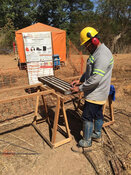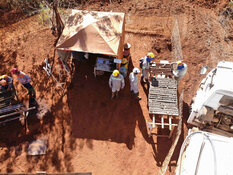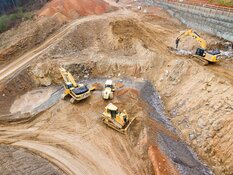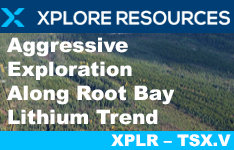Lithium prices have been on quite the roller coaster. After peaking at a high of over US$79,637 per ton in 2022 on the back of the battery power needed for electric vehicles (EVs) and the energy transition, they hit their lowest point in three years in 2024 after EV sales didn't soar as high as expected.
But that doesn't mean lithium won't still be needed, or that EVs won't eventually fulfill their promise, helping transition the economy to cleaner energy.
Chief Executive Officer Dale Henderson of Australian miner Pilbara Minerals Ltd. (PLS:ASX), which recently announced a US$370 million deal to take over Latin Resources Ltd. and its Salinas lithium project in Brazil, said his company is thinking long-term with the purchase.
"The quality of the Salinas project that Latin Resources has developed is very high quality and we think it will be a very low-cost operation once fully developed," Henderson said, according to a Reuters article. "Inevitable price cycles, it will be able to navigate those, we think, with ease."
Under the all-share deal, Latin Resources shareholders will receive 0.07 new Pilbara shares for each share held. After the deal was announced in August, shares of Latin Resources soared 56% in their biggest one-day percentage gain in more than two years, another Reuters article reported.
In Brazil's emerging lithium sector, where an "overhaul in lithium export regulations has transformed the country into a burgeoning hub for lithium production," according to S&P Global, the deal has other junior explorers wondering who could be next.
A New Hub for Lithium Production
Brazil is becoming a burgeoning hub for lithium production, unlocking vast economic potential and attracting global investments.
"With three operational plants and eight more planned, Brazil's lithium carbonate equivalent output reached 29,976 Mt (metric tons) in 2023, with expectations of up to a fivefold increase by 2028," S&P noted.
According to BMO Capital Markets analyst Greg Jones in an August 14 research report, the Pilbara acquisition of Latin Resources represented a 32% premium to Latin Resources' 30-day VWAP (volume-weighted average price).
"Based on Latin's resources of 77.7 Mt at 1.24% Li20, the consideration implies an EV (enterprise value)/resource multiple of ~US$150/t LCE, which is generally in line with multiples paid in other recent lithium developer transactions," Jones wrote.
Latin Resources' "Salinas lithium project has the potential to become one of the 10 largest rock-based lithium operations in the world in terms of production and could open up new growth markets in Europe and North America for Pilbara Minerals," Henderson told the Exposibram (Brazilian International Mining Expo and Congress) event in Brazil, according to an article in Stockhead.
"A September 2023 preliminary economic assessment outlined the potential for an 11-year operation to produce 499,000 tonnes of 5.2% spodumene at total cash costs of US$567 per tonne" at Salinas, Australian mining journalist Kristie Batten wrote for the website. "Capital costs for the two-stage operation are US$308 million, which will be refined by Pilbara as part of an optimized definitive feasibility study by Pilbara once the acquisition closes."
The deal is expected to close by early December.
An Opportunity for Buyers
BMO's Jones wrote in a late August report that the landscape in the Americas (including South America) is providing an opportunity for buyers, Batten reported.
"Given current valuations and the difficulty in raising capital, we see the conditions as being favorable for M&A from a buyer's perspective," Jones noted in the report. "In our view, projects that buyers will find the most attractive will offer high-quality resources with large-scale, long-life potential, low capital intensity, operating costs at the lower end of the cost curve, access to infrastructure, as well as benefit from a defined permitting process and social license/community support."
While the firm sees a "limited universe of potential buyers at the current time," he wrote, "These circumstances could present [an] opportunity for others to outright acquire (e.g., mining-focused private equity), or pursue strategic/joint venture investments (e.g., auto OEMs, battery manufacturers) with less competition."
"In addition, the current environment may prompt government investment, or direct involvement in order to encourage project development, which could support developer valuations and bridge the gap to a stronger M&A market," Jones wrote, according to Batten.
The Catalyst: Metal Helps Put Spark in Energy Transition
What's the big deal? Lithium is a critical metal vital in the energy transition for its use in batteries for EVs and other applications. It also is used in electronics, medicine and other industries.
Global demand for lithium is expected to maintain the steady climb it commenced in 2020 to at least 2035, Statista data show, reaching 3,829,000 metric tons of LCE from 917,000 metric tons in 2023.
According to a report by Grand View Research, market size for the metal was estimated at US$31.75 billion last year and is projected to grow at a compound annual growth rate (CAGR) of 17.7% from this year through 2030.
"The automotive application segment is expected to witness substantial growth, driven by stringent regulations imposed by government bodies on ICE automakers to reduce carbon dioxide emissions from vehicles," researchers said. "This has shifted the interest of automakers toward producing EVs, which is anticipated to benefit the demand for lithium and related products."
EVs and battery storage primarily will fuel future growth of the lithium market, Marin Katusa of Katusa Research wrote recently. He pointed out that all major electric vehicle batteries require lithium, about 1.55 pounds per kilowatt hour of battery capacity, on average.
"I think the data speaks for itself that there's more growth and opportunity on the horizon," Katusa wrote.
Slowdown Could Easily Reverse
In a July article for Reuters, Andy Home wrote that the current slowdown could easily reverse.
"One critical facilitator will be the build-out of EV charging infrastructure, a sector which has attracted far less investment than battery manufacturing," he wrote. "Car buyers in Europe and the United States are choosing hybrids because of range anxiety, and they will continue to do so until they see more charging points. The second key factor is price."
However, "the seeds of the next lithium upswing are already being sown in the current low-price environment," Home wrote.
S&P reported that local industry players in Brazil agree with Pilbara's Henderson and are confident that "the low-cost structure of their projects and projected competitive production costs will help them withstand the ongoing pricing pressure."
Following are two junior explorers operating in the country and watching the Pilbara/Latin Resources transaction with deep interest.
Atlas Lithium Corp.
Atlas Lithium Corp. (ATLX:NASDAQ) announced this year that it has more than doubled its lithium exploration portfolio in the Brazil's "Lithium Valley" to about 539 square kilometers, or nearly 54,000 hectares (approximately 133,000 acres), leading the company to believe "it has the largest claim ownership position of any listed company in this new lithium frontier" and the "largest lithium exploration footprint in Brazil."
Earlier this year, Atlas signed an offtake agreement with Mitsui & Co. Ltd. (MITSY:NASDAQ) for future production from the company's Neves Project. Mitsui is one of the largest global companies with headquarters in Japan; Warren Buffett's Berkshire Hathaway is one of its largest investors.
Mitsui invested US$30 million in purchasing common shares of Atlas Lithium. In parallel, Mitsui secured an offtake agreement with Atlas Lithium, ensuring access to 15,000 tons of lithium concentrate from the initial production with the potential to expand up to 60,000 tons annually.
The company's modular dense media separation (DMS) lithium processing plant, fabricated in South Africa and currently in pre-shipment stage, is a key part of its strategy to advance production at its Minas Gerais lithium project in a cost-effective and environmentally sustainable manner.
"Atlas Lithium's strategic initiatives in Brazil are not just pivotal for the company but also play a crucial role in the broader context of U.S. efforts to reduce dependence on foreign sources for these vital materials," wrote Mangeet Kaur Bouns for Benzinga. "The expansion of Atlas Lithium's exploration footprint in Brazil . . . highlights the potential of this region as a significant contributor to the global supply chain of critical minerals. As the world transitions to a greener energy mix, the demand for these minerals is set to skyrocket."
And it's not just for environmental sustainability. The strategic importance of the mineral extends to national security and economic development.
"China's dominance in producing and processing critical minerals may exacerbate these risks, as highlighted by recent geopolitical tensions and trade restrictions," the Benzinga report said. "To mitigate these vulnerabilities, the U.S. government is focusing on securing supply chains through partnerships and investments in countries rich in critical minerals. With its substantial reserves of copper, lithium, and other critical minerals, Latin America is emerging as a key region for such investments."
Analyst Joe Reagor of ROTH Capital Partners wrote in a research note on July 26 that "we continue to believe Atlas Lithium Corp. has the potential to enter production in early 2025."
Heiko Ihle, an analyst with H.C. Wainwright & Co., agreed in a July 9 note.
"We remain confident that the firm can start recording revenue from spodumene at Das Neves once production begins," the analyst wrote.
About 34% of Atlas Lithium is owned by management and insiders. About 11% of the shareholders are institutional, strategic partners with another 12%. The rest, about 43%, is retail.
Top shareholders include Waratah Capital Advisors Ltd. with 4.34%, Mitsui & Co. Ltd. with 12.27%, and Candace Shira Associates LLC with 1.39%, according to Reuters.
Its market cap is about US$143.8 million. It trades in a 52-week range of US$34 and US$8.37.
Lithium Ionic Corp.
Another company in the country making the transition from exploration to production is Lithium Ionic Corp. (TSX-V: LTH; OTCQX: LTHCF; FSE: H3N) has achieved a milestone with the approval of its final exploration reports for the Bandeira and Outro Lado lithium properties by Brazil's National Mining Agency (Agencia Nacional de Mineracao, or ANM).
The company has submitted both the mining concession application and the economic viability study (Plano de Aproveitamento Economico, or PAE) for its Bandeira property following the ANM's approval. The PAE outlines technical, economic, and environmental details of the mining project and is seen as essential for securing the final approval needed for the project's operational phase.
A Feasibility Study published earlier this year for the company's flagship Bandeira Lithium Project highlighted a post-tax NPV of US$1.31 billion and an IRR of 40% for a 14-year mine life producing an average of 178,000 tonnes per year of 5.5% spodumene concentrate at a low operating cost of US$444 per tonne.
 Streetwise Ownership Overview*
Streetwise Ownership Overview*
Lithium Ionic Corp. (TSX-V: LTH;OTCQX: LTHCF;FSE: H3N)
Now, Lithium Ionic is awaiting approval for the Licenca Ambiental Concomitante (LAC), an environmental license that will permit construction at the Bandeira site, with approval expected in the coming months. The LAC is another important step before the mining concession can be fully granted.
In a September 10 research report, BMO's Jones highlighted the significance of the ANM approval, stating, "LTH has now submitted the Mining Concession application and the Economic Viability Study. Achieving concession status will mark the final legal approval required to transition Bandeira from exploration to extraction/production."
The analyst maintained an Outperform(S) rating and a target price of CA$2.00 on the stock.
Canaccord Genuity Analyst Katie Lachapelle, in another September 10 research report, wrote that "from a regulatory perspective, the next major hurdle — and a key catalyst, in our view — will be the approval of the Licença Ambiental Concomitante (LAC) for the Bandeira Lithium Project." Lachapelle maintained her Speculative Buy rating for Lithium Ionic with a price target of CA$2.50.
Finally, Desjardins Analyst Frederic Tremblay rated Lithium Ionic a Buy in an August 15 research note.
Pilbara's acquisition of Latin Resources reinforces Lithium Ionic's status as a takeout candidate, Tremblay pointed out. One possibility is that Pilbara acquires Lithium Ionic's Salinas project, too, given the potential for synergies between it and Latin Resources' Salinas project. Another possibility is that Lithium Ionic gets taken out in its entirety rather than just one of its assets, by a company looking for exposure to Brazil.
"That said, we also continue to view [Lithium Ionic] as an attractive investment even if no takeout scenario ultimately materializes," wrote Tremblay.
According to the company, management and insiders own 20% of the Lithium Ionic.
One of the insiders, President & Director Helio Diniz, owns 5.52%, Director Michael Lawrence Guy owns 5.10%, Director David Patrick Gower owns 2.56%, and Andre Rezende Gumaraes owns 2.52%, according to Reuters.
30% is held by institutional investors. Reuters reports Waratah Captial Advisors owns 7.01%, JGP Gestao de Recursos Ltda owns 2.69%, RBC Global Asset Management Inc owns 1.94%, Sprott Asset Management LP owns 1.55%, BMO Asset Management owns 1.30%, and IXIOS Asset Management SA owns 1.20%. The rest is retail.
Lithium Ionic has 158.58 million shares outstanding and 131.15 million free-float traded shares.
The company's market cap is CA$104.66 million, and it trades in a 52-week range of CA$0.41 - 2.24 per share.
| Want to be the first to know about interesting Battery Metals and Cobalt / Lithium / Manganese investment ideas? Sign up to receive the FREE Streetwise Reports' newsletter. | Subscribe |
Important Disclosures:
- Atlas Lithium Corp. and Lithium Ionic Corp. are billboard sponsors of Streetwise Reports and pay SWR a monthly sponsorship fee between US$4,000 and US$5,000.
- Steve Sobek wrote this article for Streetwise Reports LLC and provides services to Streetwise Reports as an employee.
- This article does not constitute investment advice and is not a solicitation for any investment. Streetwise Reports does not render general or specific investment advice and the information on Streetwise Reports should not be considered a recommendation to buy or sell any security. Each reader is encouraged to consult with his or her personal financial adviser and perform their own comprehensive investment research. By opening this page, each reader accepts and agrees to Streetwise Reports' terms of use and full legal disclaimer. Streetwise Reports does not endorse or recommend the business, products, services or securities of any company.
For additional disclosures, please click here.









































